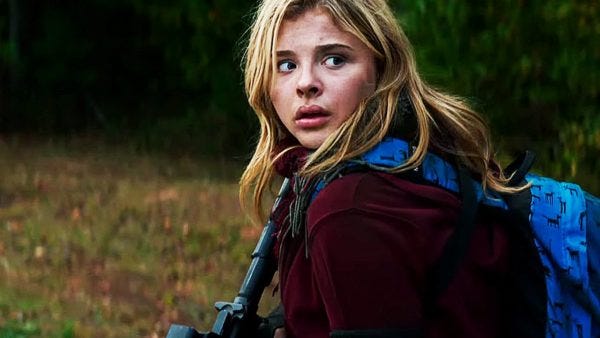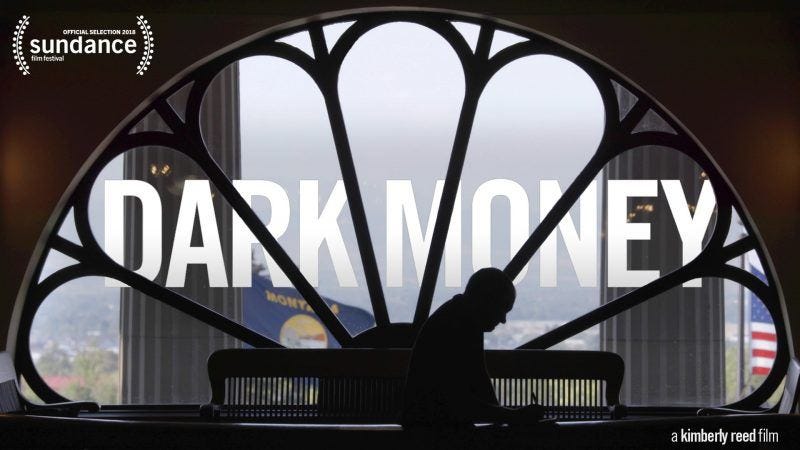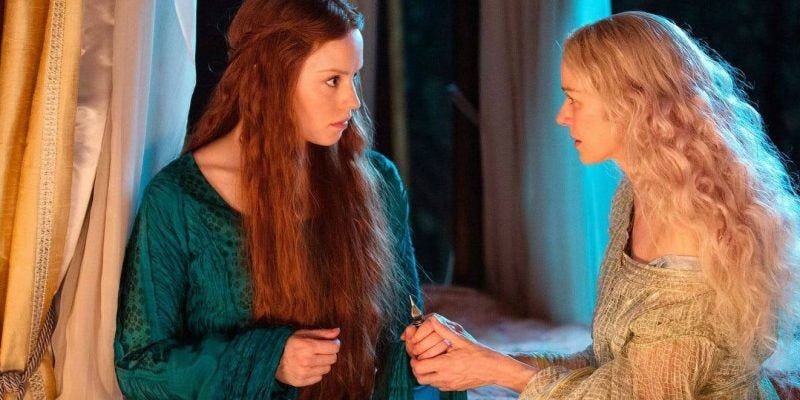Sundance 2018 Day 5: Chloë Moretz Conversion Therapy, ‘Ophelia’ and ‘Dark Money’
Click to read the full story: Sundance 2018 Day 5: Chloë Moretz Conversion Therapy, ‘Ophelia’ and ‘Dark Money’
It’s already the middle of the 2018 Sundance Film Festival season, and things are only getting better including Chloë Grace Moretz in The Miseducation of Cameron Post which is a big must see. This is her standout award-winning role so don’t be surprised to see it pick up a few awards in 2019.
As we previously reported, 16 of the 2018 Academy Award nominations were on films that Sundance had supported so you can expect this one to be yet another.

The Miseducation of Cameron Post
The titular heroine of The Miseducation of Cameron Post seems like any other pretty girl at her high school — until she’s caught making out with another female student and gets sent to an aggressive conversion therapy center. The latest comedy-drama from Sundance vet Desiree Akhavan premiered Monday in the U.S. Dramatic Competition.
Chloë Grace Moretz offers a complex, winning performance as Cameron, who is sent to live in a Cuckoo’s Nest–like setting where she befriends the other so-called “bad kids” forced to endure “pray the gay away” treatment. The group of kids, including an amputee who goes by “Jane Fonda” (an affecting Sasha Lane), develop a strong connection and begin to create their own sense of validation, under the watchful eye of a Nurse Ratched–like doctor (Jennifer Ehle) and her gentle brother (John Gallagher Jr.), who the kids learn was once just like them.
Fans of Akhavan’s previous rom-com Appropriate Behavior will notice the way she punctuates dramatic scenes with her distinctive humor in the new film, which she co-adapted along with Cecilia Frugiuele from the popular novel by Emily M. Danforth. “I read the book and laughed so hard, and I felt like shit too,” Akhavan told the audience during the Q&A that followed the premiere. “That was the goal.”
Moretz, who said that she and Akhavan met with many conversion therapy survivors, added that she was struck by the script’s humor the very first time she read it. “One of our first conversations was about [how] the reality these kids deal with is so heavy, but we wanted the interpersonal relationships to be real and fun,” she said.
The director said she was initially terrified of the project because the scope and the ensemble were so big. “I loved the book so much that I wasn’t sure I’d be able to do it,” she shared. “What’s amazing [as] a director is just having good taste and believing in that taste and never wavering in it. It’s a good film because I curated a very good team. I would have been too intimidated to make this without the tools I needed.”
Matangi / Maya / M.I.A.
“Never make films about people who are still alive.”
The second-ever screening of a highly anticipated music documentary is news enough, but those who were at the Prospector Theater on Monday night were treated to a double dose of drama. The first part of the program happened on screen in the form of Matangi / Maya / M.I.A., a film that traces the rise of international pop star M.I.A. (aka Maya Arulpragasam) from Sri Lanka to London, from art school to activism, the Super Bowl and beyond. The film was directed by Steve Loveridge, Maya’s schoolmate from when they were both aspiring documentary filmmakers, and includes footage shot by both Loveridge and Maya herself, whose diary-like entries from a trip back to Sri Lanka in 2001 serve as a recurring motif for the narrative.
The second part of the program happened on stage, as Loveridge was joined by Arulpragasam for a Q&A session that was notable for the level of candor and tension publicly exhibited by two artists coming to terms with the fruits of their collaboration and friendship. Throughout the 15-minute session, an emotional pendulum swung between them, and between a sense of peaceful accomplishment and tetchy unfinished business. Things started out tame enough as Loveridge talked of their initial connection. “We met at art school at about 1995, doing a fine art degree at Central Saint Martins, and we were specializing in film and video. This girl turned up from out of the blue with pink stilettos and hoop earrings and was like, ‘Hey I’m here.’ I was the shyest person ever, really timid. And it was a really unlikely friendship,” he said. During the ensuing years, they remained friends, and Maya remained more interested in film than music. “She never mentioned doing music or having any aspirations to do anything like make songs. She couldn’t sing,” he said, which elicited an eyebrow raise from Arulpragasam, “and then suddenly out of nowhere, as she says in the film—it happened so fast.”
Then Arulpragasam, dressed in a big orange Muppet-shag-furry coat, took the mic. (The two shared a single microphone, and their passing—or stealing—it back and forth became a side drama throughout the session.) Without prompting, she began to share her feelings about the film. “Yesterday when I watched it, I was in shock. Today I feel like I like it,” she said. “Though there are still 300 different edits that I want. I feel like there’s loads of bits of me that don’t need to be there, really.”
“I think everything’s there for a reason, and making sense out of chaos was a big part of the job on this,” Loveridge said.
When asked about her specific grievances with the film, she continued. “I would change the ending,” she said. “And it would be less about me and more about…”
“You can imagine how difficult this has been to make,” Loveridge said, to laughs, after recovering the mic. Then he turned to his subject. “You chose me and that’s what you get,” he said, to which the star smiled, and the audience roared.
Arulpragasam was asked about the incident at the 2012 Super Bowl halftime show when she flipped the bird to the television audience, which led to further wrangling over the mic, though Loveridge said it was to protect the artist from saying something she wasn’t supposed to say, per a legal agreement with the NFL. She talked about her lack of representation, with a manager quitting the day before the incident, and a general lack of understanding of the challenges she faces, which she thought wasn’t fully covered by the film. “There really was a lot of stuff he left out. It’s not just misunderstanding from the press, which I think this feels like. It was also inside the industry, and it was chaos everywhere. People go, ‘Well you create it; you create it.’ But it was just sort of not having people that understand all the different communities that went into making up who I was,” she said. Then she looked back over to Loveridge. “It was very difficult to connect the dots,” she said. “But you did well.”
Loveridge repaid the compliments, getting teary as he spoke of his friend of two decades. “The toughness and confidence that you have to have, on the street and backstage and in your private and family life, that confidence behind the scenes is even more impressive. The battles that nobody knows about, with record labels and shitty producers and men that don’t give you the credit. I’ve seen you battle through some really difficult things,” he said. “And I think your confidence is really contagious. You make me braver. I think it’s really precious the trust you gave me.”
“I haven’t had therapy yet,” Arulpragasam said, eliciting laughs, before grappling in real time with what the film stirred up in her. “It feels like that’s what the art is there for, to work those things out. But the problem is that I haven’t gotten around to just making what I want to make. You just feel like a sponge for the stuff around you. So you get sucked into talking about those things. That’s kind of why this footage is really weird to watch for me. Like the stuff at home, it’s not even my family now. It hasn’t properly been dealt with.”
When asked why more entertainers with huge audiences don’t use their fame to speak out about causes they care about, as Arulpragasam has throughout her career, she talked about the importance of her trip back to Sri Lanka and alluded to how things have changed in recent months. “I wasn’t political until I had gone there. Because I didn’t know,” she said. “I think that’s why even people with platforms, their intentions might be good and they might be good people, but they just don’t know what’s going on. Sometimes I felt like there was something wrong with me, that I was seeing all of this craziness and nobody else was. But now I feel like I’m quite normal.”
Yet she also talked about working out how and when to express herself. “What’s good anger and what’s not good anger? Everybody was like, ‘Oh my god you need to get a Twitter editor, you can’t have direct access to Twitter,’ which I know you guys say that about Donald Trump. But you said it about me first,” she said, slyly. “I’ve just tried to work what’s ego anger. If your anger is led by ego, then I think it’s shit.”
Then Arulpragasam and Loveridge hugged, waved, and handed over their microphone, likely continuing their conversation backstage, and perhaps on other stages to come.

Dark Money
Citizens of the state of Montana have a keen sense of what can go wrong when corporations get involved in politics. In 1912, after a copper mining magnate tried to buy a seat in the U.S. Senate, the state passed one of the first laws prohibiting campaign contributions from corporations. That awareness of the need to prevent the excesses of capitalism has remained with Montanans to this day.
Other states passed similar laws in later years, but when the Supreme Court’s Citizens United ruling was passed down in 2010 — allowing corporations to contribute without disclosure, resulting in unlimited, untraceable “dark money” to pour into campaigns around the country — Montana was the only state that fought back. Kimberly Reed’s Dark Money follows the government officials, journalists, and citizens who stood up for the integrity of the political process in the conservative state.
As Reed brought the contributors on stage at the film’s premiere, she expressed her gratitude. She also reminded the audience that these individuals are not so different from the rest of us: “These are everyday heroes — who are working in government, who are journalists — who are taking back our democracy by just paying attention.”
“Paying attention” may be a bit easier in a state with Montana’s population, but Reed wants to “show other states how they can pay attention so that every state is as small as Montana [and] we can pay attention to where this money is coming from and crack down on it.”
Former Federal Election Commission member Ann M. Ravel said that the most important thing we can all do to help in this effort is to get involved. “You have to be engaged, and you have to get other people engaged too. … Engagement in the political process is the most important way that we can make a difference.”
The group shared some ideas on how we can all do a better job of this:
Vote.
Contribute to candidates that support ideas like clean campaign funding.
Volunteer.
Support journalism, whether it’s independent or larger news organizations, by paying for subscriptions.
Stay informed on campaign finance issues through resources like FollowTheMoney.org and OpenSecrets.org.
Support laws that require full disclosure of political candidates’ finances.
Get involved with your political party, which is sometimes more effective than focusing on just one specific issue.
Run for office yourself.
Hold your elected officials accountable, and make them answer questions about campaign finance.
Those who worked on this story hope it will act as a case study for others around the country to follow. Reed explained, “Our hope with the film is to show what happened with the microcosm in Montana, but to do so in a way that is inspiring to everybody else in all the other 49 states. … All of us need work on this front.”

Ophelia
Easily one of the most lavishly made films of the 2018 Festival, Ophelia is a feast for the eyes. Adapted from Lisa Klein’s young adult novel, director Claire McCarthy’s retelling of Hamlet through the eyes of its tragic heroine debuted in the Premiere section Monday night.
Daisy Ridley makes an appealing period heroine as the lady-in-waiting to the queen (Naomi Watts), who catches the eye of Prince Hamlet (George MacKay) as things in the palace begin to go awry. Forced to keep their affair a secret, many betrayals strike the court, and threaten to destroy a royal family forever, but don’t expect the film to end the way Shakespeare wrote it. This Ophelia is not the doomed teenager we’ve seen countless times. She’s a heroine for this age of female empowerment.
McCarthy, whose long red locks resemble those worn by Ridley in the movie, explained that this revisionist look at the familiar story allows viewers to see gender parity through the frame in which women are often shut out of the conversation. “I think there’s a new frontier that we’re moving through when we start to see things through a different point of view by allowing women to have a voice and also to enable to have men have a voice in a different way,” she told the audience after the screening.
“In the original play she’s undone by her relationship with Hamlet,” she said. “In this version, we wanted to turn that on its head and create an Ophelia that’s a much more empowered character who takes agency in her life and making choices as opposed to being a victim of them.”
Watts, who plays dual roles including Queen Gertrude, agreed that this is a refreshing way to experience the classic story. “It was great to create these fantastic, multi-dimensional parts for women,” she stated.
The actress also joked that she read the Cliff Notes of Hamlet and watched the Mel Gibson version of the film in preparation and noted the relevance of the story to modern audiences. “It’s not always easy to put Shakespeare on film,” she said. “The themes of the play and film are still so relevant today. We turned it on its head and drove it through the female point of view. It just makes it unbelievably relevant.”
The director spoke about how the location (the spectacular scenery of Czechoslovakia, substituting for Denmark is a highlight) serves as a character in the story. “In some ways, it feels like the original Hamlet and the classic representations of Ophelia –– she’s viewed from above from a God’s eye view, and she’s almost consumed by nature and the world around her,” she shared. “In this version, we wanted to take the camera underwater and put Ophelia’s experience inside the drama. We wanted to see her as part of nature, not just a victim of the world around her.”
The post Sundance 2018 Day 5: Chloë Moretz Conversion Therapy, ‘Ophelia’ and ‘Dark Money’ appeared first on Movie TV Tech Geeks News By: George Cando


